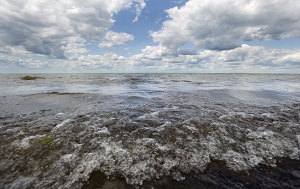Buzzards Bay being impacted by climate change

An analysis of long-term, water quality monitoring data reveals that climate change is already having an impact on ecosystems in the coastal waters of Buzzards Bay, Mass. The impacts relate to how nitrogen pollution affects coastal ecosystems.
Utilizing 22 years of data collected by a network of citizen scientists, researchers from the Woods Hole Oceanographic Institution (WHOI) and their colleagues at the Buzzards Bay National Estuary Program, the Buzzards Bay Coalition, and the Marine Biological Laboratory found that average summertime temperatures in embayments throughout Buzzards Bay warmed by almost 2 degrees Celsius—roughly 4 degrees Fahrenheit.
“That is a rapid temperature increase for marine life,” said Jennie Rheuban, a research associate at WHOI and lead author of the paper published January 15, 2016, in the journal Biogeosciences. “For some species, a single degree Fahrenheit change can mean the difference between a comfortable environment and one where they can no longer thrive.”
In addition, Rheuban added, the warmer water temperatures are fueling an increase in algae growth. While algae and other microscopic plants, which form the base of the marine food chain, are vital to a healthy ecosystem, too much can cause murky water, reduce sunlight and oxygen levels, and ultimately cause harm to marine life.
This means added challenges for improving water quality in some Cape Cod and southeastern Mass. watersheds that are already suffering from too much nitrogen, which is most commonly caused by releases from septic systems and wastewater treatment plants, atmospheric pollution, and fertilizer runoff. Excess nitrogen also boosts algae growth.
“What we’re seeing in the long-term data is that the same levels of nitrogen in the system results in much more algae growth than it did two decades ago,” Rheuban said.
This increase in algae growth and chlorophyll means that water quality is worse for the same amount of nitrogen, which has big implications for water quality targets and clean up plans.
An analysis of long-term, water quality monitoring data reveals that climate change is already having an impact on ecosystems in the coastal waters of Buzzards Bay, Mass. The impacts relate to how nitrogen pollution affects coastal ecosystems. (Tom Kleindinst, Woods Hole Oceanographic Institution)
Source: Environmental News Network

